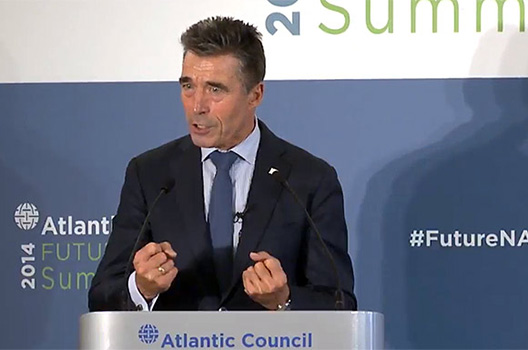
Leaders at NATO Summit Criticize Russia, Caution against Isolationism
The crises in the Middle East and Russia’s invasion of Ukraine are expected to top the agenda as Western leaders gathered in Wales for the NATO Summit this week.
NATO Secretary General Anders Fogh Rasmussen, speaking at the Atlantic Council’s Future Leaders Summit, called Russia’s aggression against Ukraine “a wakeup call.”
“It has reminded us – reminded all of us – that our freedom, security, and prosperity cannot be taken for granted. That some are trying to redraw dividing lines in Europe with force, and in blood. A Europe whole, free, and at peace remains a work in progress.”
Watch the video of his remarks here.
The Council’s Future Leaders Summit is the premier public diplomacy event alongside the NATO Summit in Wales where leaders from sixty countries have converged to engage in key discussions on major global security challenges. (Learn more about the Council’s Future Leaders Summit here.)
“We [are seeing] the greatest number of crises since the end of the Cold War, emerging at the same time in different places on our periphery. [This] climate of chaos beyond our borders could have direct implications for us at home — from criminal regimes and violent extremists to crippling cyber attacks. It is for all these reasons that the Wales Summit is a critical summit, at a critical time. And it is why today and tomorrow,” said Rasmussen.
While Ukraine will likely dominate the summit, other matters – such as creating a rapid response force and rise of the Islamic State in Syria and Iraq– will be discussed.
Echoing Rasmussen’s remarks, President Barack Obama and British Prime Minister David Cameron published an op-ed calling for a stronger NATO to “face evolving global challenges.“
“We meet at a time when the world faces many dangerous and evolving challenges. To the east, Russia has ripped up the rulebook with its illegal, self-declared annexation of Crimea and its troops on Ukrainian soil threatening and undermining a sovereign nation state. To the South, there is an arc of instability that spreads from North Africa and the Sahel, to the Middle East,” Obama and Cameron wrote in the Times of London.
They also cautioned against taking an isolationist approach amid these challenges, arguing that conflicts in Iraq, Syria, and elsewhere ultimately threaten Western democracies and homeland security.
“Those who believe in stepping back and adopting an isolationist approach misunderstand the nature of security in the 21st century. Developments in other parts of the world, particularly in Iraq and Syria threaten our security at home. And NATO is not just an alliance of friends who come to the aid of each other in times of need, it is also an alliance based on national self-interest.”
Emphasizing the present need to strengthen the Alliance, Cameron and Obama concluded:
damon
“Ultimately by working together we are stronger, whether in standing up to Russia or confronting ISIL. So in Newport today we must summon up the shared resolve that inspired NATO’s founding fathers. With more than sixty countries represented at the Summit, we can build this proud alliance of transatlantic nations into a more effective security network that fosters stability around the world.”
Image: Anders Fogh Rasmussen, Secretary General, NATO provides opening remarks at the Future Leaders Summit in Newport, Wales (photo:NATO)
